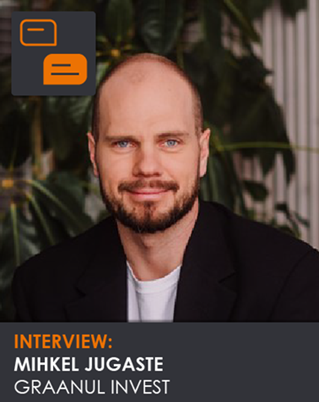Mihkel Jugaste de Graanul Invest : « La voie à suivre est claire : diriger avec durabilité et croître avec détermination ». #2
Bioenergy Europe’s team and board members had the opportunity to visit Graanul Invest’s Imavere pellet plant a month ago. Impressed by the company’s innovative practices and its dedication to leading by example in the bioenergy market, we decided to speak to Mihkel Jugaste who is Graanul Invest’s Chief Sustainability Officer, responsible for managing the group’s environmental, social and corporate governance.
—
Can you introduce AS Graanul Invest – its history, products, and position in the Estonian and European bioenergy markets?
AS Graanul Invest is a leading international renewable energy company, with a core focus on wood pellet production and biomass-based electricity and heat generation. Founded in 2003, we’ve grown from a regional innovator into Europe’s largest wood pellet producer, with an annual production capacity of 2.7 million tonnes.
We operate across Estonia, Latvia, Lithuania, and the United States, managing 12 state-of-the-art pellet plants, 6 combined heat and power (CHP) plants, and 4 shipping vessels. Over the past two decades, we’ve built a reputation for unmatched sustainability, reliability, and operational excellence.
What sets us apart is our evolution from a traditional pellet producer into a fully integrated biomass bioeconomy company. We generate renewable energy both internally and externally, and our operations are deeply embedded in circular, resource-efficient systems. We encourage everyone to explore our sustainability reports to understand the depth of our commitment and innovation.
The Bioenergy Europe team recently visited your Imavere plant—your first pellet facility. Can you tell us more about its current operations and what makes it unique?
Imavere has undergone several upgrades over the years, but today it represents what we call the “Graanul Invest layout”—our flagship design that integrates our best technologies and operational know-how. We’ve replicated this model at Osula and Incukalns, each capable of producing over 350,000 tonnes annually.
The plant is designed for maximum feedstock flexibility, capable of processing all types of wood residues and low-quality stemwood, regardless of shape or size. This ensures we can utilize cascading materials from across the wood and forestry sector, provided they meet our strict sustainability criteria.
One standout feature is our paperless scalehouse. Here, we verify all sustainability credentials—certification, origin, and compliance—before the feedstock even enters the facility. Loads are then scanned using 3D volume measurement technology, ensuring precise data collection and real-time traceability. This digital-first approach allows us to meet and exceed the requirements of EUDR, REDIII, and stakeholder expectations.
While we can’t disclose every technical detail of our process, one transformative element is our on-site biomass CHP plant. It powers the facility with renewable energy, significantly enhancing production uptime, efficiency, emissions control, and overall ESG. This, I know is still unique in the global wood pellet sector and continues to be a real advantage for us.
In short: cascading use of sustainable biomass, zero waste, full digitalization, and best-in-class efficiency—that’s the Graanul Invest standard.
How has demand for wood pellets evolved over the years, both for the Imavere plant and the company as a whole? Have there been any major challenges?
Global demand for wood pellets has steadily increased, but the growth is no longer driven by the EU. The European market is stable, with fluctuations only happening as a result of geopolitical events and extreme weather.
One of our biggest challenges has been the slow pace of regulatory development around sustainability. This has allowed unsustainable supply chains to enter the EU market, undermining the credibility of the sector. The premium pellet segment has been particularly affected, with locally produced, high-quality pellets struggling to reach consumers.
If European households aren’t using European pellets, we have a systemic issue. We need stronger enforcement and smarter policy to protect sustainable producers and ensure the integrity of the market.
Graanul Invest has been ENplus® certified for many years. How have quality and sustainability certifications shaped the pellet industry?
We’ve always believed in leading by example. Third-party certification is embedded in our DNA—it’s how we demonstrate our commitment to sustainability, transparency, and quality.
Certifications like ENplus® have been instrumental in defining what a sustainable wood pellet is. They’ve helped unify standards across the industry, from feedstock sourcing and production processes to logistics and end-use quality. By standardizing best practices, certification schemes have elevated the entire sector and built trust with consumers and regulators alike.
But as I indicated before. This has started to fade away and we need to take the next step. SBP 2.0 is a good example of a next step – sustainability requirements established by a multi stakeholder approach that require best practices in every part of the value chain.
ENplus® and other schemes should not fall behind.
Looking ahead, what trends or opportunities do you see shaping the future of the wood pellet industry?
The future is full of opportunity—but only if we start from the right foundation. Whether it’s Japan reaching full capacity, Poland expanding its bioenergy sector, or sustainable aviation fuel (SAF) scaling up, sustainability and quality must be the baseline.
New markets should not start from scratch. They’ll need to adopt THE best practices of 2025. That’s our opportunity: to continue delivering evidently positive climate impact through responsible, high-quality bioenergy.
If we fall back into a mindset focused solely on price and volume, we risk losing our renewables potential and being compared to fossil fuels. The path forward is clear: lead with sustainability and grow with purpose.

